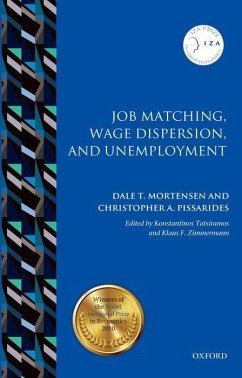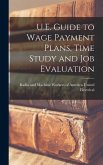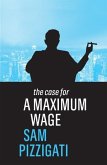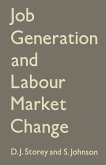Dale T Mortensen, Christopher A Pissarides
Job Matching, Wage Dispersion, and Unemployment
Herausgeber: Tatsiramos, Konstantinos; Zimmermann, Klaus F
Dale T Mortensen, Christopher A Pissarides
Job Matching, Wage Dispersion, and Unemployment
Herausgeber: Tatsiramos, Konstantinos; Zimmermann, Klaus F
- Gebundenes Buch
- Merkliste
- Auf die Merkliste
- Bewerten Bewerten
- Teilen
- Produkt teilen
- Produkterinnerung
- Produkterinnerung
A selection of key papers from the winners of the Nobel Memorial Prize 2010. It features their most important work on unemployment, labour market dynamics, and the equilibrium search model.
Andere Kunden interessierten sich auch für
![U.E. Guide to Wage Payment Plans, Time Study and Job Evaluation U.E. Guide to Wage Payment Plans, Time Study and Job Evaluation]() U.E. Guide to Wage Payment Plans, Time Study and Job Evaluation33,99 €
U.E. Guide to Wage Payment Plans, Time Study and Job Evaluation33,99 €![The Case for a Maximum Wage The Case for a Maximum Wage]() Sam PizzigatiThe Case for a Maximum Wage14,99 €
Sam PizzigatiThe Case for a Maximum Wage14,99 €![Entrepreneurial Wage Dynamics in the Knowledge Economy Entrepreneurial Wage Dynamics in the Knowledge Economy]() Adam K. KorobowEntrepreneurial Wage Dynamics in the Knowledge Economy104,99 €
Adam K. KorobowEntrepreneurial Wage Dynamics in the Knowledge Economy104,99 €![Entrepreneurial Wage Dynamics in the Knowledge Economy Entrepreneurial Wage Dynamics in the Knowledge Economy]() Adam K. KorobowEntrepreneurial Wage Dynamics in the Knowledge Economy39,99 €
Adam K. KorobowEntrepreneurial Wage Dynamics in the Knowledge Economy39,99 €![Job Generation and Labour Market Change Job Generation and Labour Market Change]() D. J. StoreyJob Generation and Labour Market Change63,99 €
D. J. StoreyJob Generation and Labour Market Change63,99 €![All I Want Is a Job! All I Want Is a Job!]() Mary GattaAll I Want Is a Job!111,99 €
Mary GattaAll I Want Is a Job!111,99 €![The Case for a Maximum Wage The Case for a Maximum Wage]() Sam PizzigatiThe Case for a Maximum Wage46,99 €
Sam PizzigatiThe Case for a Maximum Wage46,99 €-
-
-
A selection of key papers from the winners of the Nobel Memorial Prize 2010. It features their most important work on unemployment, labour market dynamics, and the equilibrium search model.
Produktdetails
- Produktdetails
- Verlag: Oxford University Press, USA
- Seitenzahl: 218
- Erscheinungstermin: 25. Juni 2011
- Englisch
- Abmessung: 223mm x 141mm x 22mm
- Gewicht: 401g
- ISBN-13: 9780199233786
- ISBN-10: 0199233780
- Artikelnr.: 33251989
- Verlag: Oxford University Press, USA
- Seitenzahl: 218
- Erscheinungstermin: 25. Juni 2011
- Englisch
- Abmessung: 223mm x 141mm x 22mm
- Gewicht: 401g
- ISBN-13: 9780199233786
- ISBN-10: 0199233780
- Artikelnr.: 33251989
Dale T. Mortensen is the Niels Bohr Visiting Professor of Economics at Aarhus University, a research associate of the National Bureau of Economic Research (NBER), and an IZA Research Fellow. He received his BA in Economics from Willamette University in 1961 and his PhD in Economics from Carnegie-Mellon University in 1967. Mortensen is a fellow of Econometrica Society, the American Academy of Arts and Sciences, the Society of Labor Economics, and the European Economic Association. He was awarded the Society of Labor Economics Mincer Prize in 2007 and elected an American Economic Association Distinguished Fellow in 2008. Among his publications are over fifty scientific articles and his book Wage Dispersion: Why Are Similar Workers Paid Differently? Christopher A. Pissarides holds the Norman Sosnow Chair in Economics. He specialises in the economics of unemployment, labor market theory and policy, and economic growth and structural change. Pissarides has published extensively in professional journals and his book Equilibrium Unemployment Theory is a standard reference in the field. He is President Elect 2010 of the European Economic Association, Fellow of the British Academy, the Econometric Society, the European Economic Association and the Society of Labor Economists. His editorial activities include the chair of the Economica board, and membership of the editorial board of the AEJ: Macroeconomics and other journals. He is research fellow of IZA, the Centre of Economic Performance at LSE, and the Centre for Economic Policy Research (CEPR London).
* Introduction by the Editors: Mortensen and Pissarides: Job Creation
and Job Destruction in the Theory of Unemployment
* Introduction: The Flow View of the Labor Market
* 1: The Matching Process as a Noncooperative Bargaining Game
* 2: Short-Run Equilibrium Dynamics of Unemployment, Vacancies, and
Real Wages
* 3: Unemployment and Vacancies in Britain
* 4: Job Creation and Job Destruction in the Theory of Unemployment
* 5: Equilibrium Wage Distributions: A Synthesis
and Job Destruction in the Theory of Unemployment
* Introduction: The Flow View of the Labor Market
* 1: The Matching Process as a Noncooperative Bargaining Game
* 2: Short-Run Equilibrium Dynamics of Unemployment, Vacancies, and
Real Wages
* 3: Unemployment and Vacancies in Britain
* 4: Job Creation and Job Destruction in the Theory of Unemployment
* 5: Equilibrium Wage Distributions: A Synthesis
* Introduction by the Editors: Mortensen and Pissarides: Job Creation
and Job Destruction in the Theory of Unemployment
* Introduction: The Flow View of the Labor Market
* 1: The Matching Process as a Noncooperative Bargaining Game
* 2: Short-Run Equilibrium Dynamics of Unemployment, Vacancies, and
Real Wages
* 3: Unemployment and Vacancies in Britain
* 4: Job Creation and Job Destruction in the Theory of Unemployment
* 5: Equilibrium Wage Distributions: A Synthesis
and Job Destruction in the Theory of Unemployment
* Introduction: The Flow View of the Labor Market
* 1: The Matching Process as a Noncooperative Bargaining Game
* 2: Short-Run Equilibrium Dynamics of Unemployment, Vacancies, and
Real Wages
* 3: Unemployment and Vacancies in Britain
* 4: Job Creation and Job Destruction in the Theory of Unemployment
* 5: Equilibrium Wage Distributions: A Synthesis








